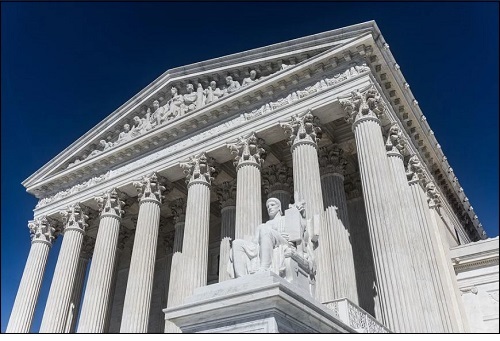
|
|

|
|
| July 27, 2024 |
|
Trump asks Supreme Court to delay criminal trial for immunity appeal 
WASHINGTON − Former President Donald Trump on Monday asked the Supreme Court to continue to delay a criminal trial into whether he tried to overturn the 2020 election while he appeals a lower court's ruling that he's not immune from prosecution.
"Without immunity from criminal prosecution, the presidency as we know it will cease to exist," Trump's lawyers told the court. Justice Department special counsel Jack Smith contends Trump’s actions were outside the bounds of official actions because they were for his personal political gain as he sought to illegally overturn the legitimate election results through fraud. Trump's move comes as the GOP presidential frontrunner faces four separate criminal indictments stretching from New York to Florida and a crowded calendar of court dates amid the rising heat of the 2024 campaign. The former president's lawyers urged the high court to postpone the trial while his appeal is heard at the full D.C. Circuit and then, if necessary, before the Supreme Court. The three-judge panel of appeals judges called for a postponement in the trial only if Trump appealed directly to the Supreme Court. Trump’s lawyers argued that starting the trial immediately would “radically disrupt†Trump’s ability to campaign against President Joe Biden. Such disruption, they wrote, “appears to be the whole point†of the special counsel’s desire to move quickly. And it threatens the First Amendment rights of the tens of millions of American voters who are “entitled†to hear Trump’s campaign message, the lawyers said. In a separate case, the Supreme Court is also considering whether Trump's role in the Jan. 6, 2021, attack on the U.S. Capitol disqualifies him from the presidency. A three-judge panel of the D.C. Circuit Court of Appeals unanimously ruled Feb. 6 that Trump can be tried for allegedly trying to steal the 2020 election. "For the purpose of this criminal case, former President Trump has become citizen Trump, with all of the defenses of any other criminal defendant," the panel wrote. "But any executive immunity that may have protected him while he served as President no longer protects him against this prosecution." What comes next There are several possibilities as to what happens next. The fastest resolution would be if the Supreme Court leaves the appeals court’s decision standing and allows trial preparations to resume. In that case, the trial could start in a few months. The longest would be if it agrees to postpone the trial and gives Trump the full time available to file his appeal. Under that scenario, Trump would likely not be tried until after the November election. The court could also keep the trial on hold but fast-track the appeals process. That could allow for enough time for a trial verdict before the November election, if the high court agrees with D.C. Circuit Court of Appeals that a former president does not have blanket immunity for any possible crime committed while in office. But Trump's trial might not be completed before Republicans meet in Milwaukee in mid-July to choose their nominee. Former South Carolina Gov. Nikki Haley is the only remaining serious challenger to Trump and polls show her trailing him by a large margin. Four justices must agree in order to hear a case. It would take five of the nine justices to keep the trial on hold while Trump appeals. U.S. District Judge Tanya Chutkan had scheduled Trump's trial for March 4, but she put proceedings on hold in December while the immunity issue was being appealed. (Source: USA Today) Story Date: February 13, 2024
|